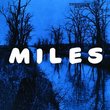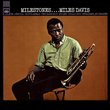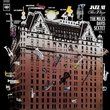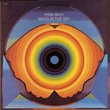| All Artists: Miles Davis Title: Newport 1958 Members Wishing: 1 Total Copies: 0 Label: Sbme Import Release Date: 4/3/2001 Album Type: Import Genres: Jazz, Pop Style: Bebop Number of Discs: 1 SwapaCD Credits: 1 |
Search - Miles Davis :: Newport 1958
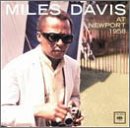 | Miles Davis Newport 1958 Genres: Jazz, Pop
Japanese version featuring a limited LP style slipcase cover. DSD digitally remastered. |
Larger Image |
CD DetailsSynopsis
Album Details Japanese version featuring a limited LP style slipcase cover. DSD digitally remastered. Similar CDs
|
CD ReviewsMiles in stride Samuel Chell | Kenosha,, WI United States | 04/04/2002 (5 out of 5 stars) "There's certainly nothing inferior, nothing missed or bungled on this set, which Columbia inexplicably held for 6 years before its initial release, then waited another 20 for a subsequent release, finally producing this bright and bracing remastered version.Miles is definitely out to prove that the loss of two key members of his previous sextet--pianist Red Garland and percussionist Philly Joe Jones--was in no way injurious to its level of creativity or intensity. The tempos are way up (as Miles was inclined to call them when not in the studio), and Coltrane tears through changes like a man possessed--a harbinger of what was to come, but at an earlier stage than many listeners might have previously assumed.Anyone who has read Peter Pettinger's biography of Bill Evans is aware of the tensions--racial as well as musical--that Bill felt during his relatively brief stint with Miles. Caught between the onslaught of Coltrane and Cannonball, it's a wonder that he gets heard at all. But he chooses his moments carefully, and makes the most of each, making the album an especially valuable record of the band during Bill's occupation of the piano chair. And Paul Chambers is a bedrock through the entire session. Miles was the "enabler," placing Coltrane and Evans together on the same stage from which each would depart to become, arguably, the two most influential voices in jazz post-1960. Coltrane was the "winner" on this date, but the Evans' influence would prevail when Miles summoned Bill to rejoin the band for its recording a year later on what would become the most successful, popular, seminal jazz album of all time, "Kind of Blue.""Miles at Newport 1958" represents a key chapter in the story of jazz after bebop, and this reissued, expertly remastered recording helps make up for the exclusion of Miles' group in "Jazz on a Summer's Day," the highly regarded filming of the 1958 festival." The Miles Davis Sextet, in person G B | Connecticut | 09/27/2001 (4 out of 5 stars) "At the 1958 Newport Festival, Miles Davis was leading one of his most celebrated groups: a sextet consisting of John Coltrane (tenor sax), Cannonball Adderley (alto sax), Bill Evans (piano), Paul Chambers (bass), and Jimmy Cobb (drums). This same lineup would record Kind of Blue within a year. The results here aren't quite as magical. Coltrane, at the peak of his sheets-of-sound period, is incredible -- he tears through the songs with ferocity. Just listen to "Two Bass Hit". Bill Evans, on the other hand, sounds a little out of place on the bop tunes that compose the bulk of this set; his reflective, abstract playing doesn't fit in as well in this context. Adderley and Davis play well though I wouldn't call this performance a milestone for either one. The sextet also tackle a few of the tunes a bit faster than they can handle, and they bungle the theme to "Ah Leu Cha". But this is still a very good recording of a great group, and worth buying for the hardcore Davis aficionado." Completely Flawed Scott McFarland | Manassas, VA United States | 10/08/2004 (2 out of 5 stars) "There is no bass on this recording. An eerie absense of bass. You can imagine why, on this new edition, because you hear an engineer before the band starts up saying "Tell Chambers to stop fooling with his microphone".
The band is worth hearing and can be heard on other recordings from this year, including radio broadcasts, when bass was present. " |

 Track Listings (7) - Disc #1
Track Listings (7) - Disc #1